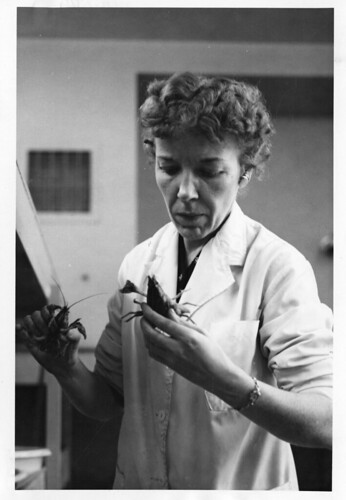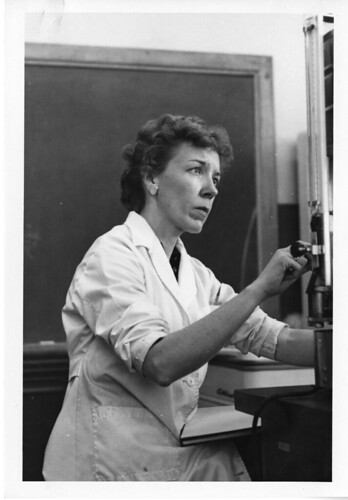 For the month of March, the Smithsonian Institution Archives will be posting new photos of women scientists to the Flickr Commons and highlighting these women in blog posts on THE BIGGER PICTURE, in honor of Women's History Month. Krill are very little things that sustain everything from whales, to creatures not much bigger than krill themselves. One species of krill found in Antarctic waters, Euphausia superba, held a special fascination for pioneering woman scientist, Mary Alice McWhinnie (1922-1980), Professor of Biology, DePaul University (1946-1980). She was very interested in understanding the krill’s physiology and how it managed to thrive in such an extreme environment. But, there is only so much that could be accomplished in the lab. Field work was the obvious next step, but until the 1960s, no American female scientists had been selected to carry out research in Antarctica.
For the month of March, the Smithsonian Institution Archives will be posting new photos of women scientists to the Flickr Commons and highlighting these women in blog posts on THE BIGGER PICTURE, in honor of Women's History Month. Krill are very little things that sustain everything from whales, to creatures not much bigger than krill themselves. One species of krill found in Antarctic waters, Euphausia superba, held a special fascination for pioneering woman scientist, Mary Alice McWhinnie (1922-1980), Professor of Biology, DePaul University (1946-1980). She was very interested in understanding the krill’s physiology and how it managed to thrive in such an extreme environment. But, there is only so much that could be accomplished in the lab. Field work was the obvious next step, but until the 1960s, no American female scientists had been selected to carry out research in Antarctica.  McWhinnie’s pioneering work at the bottom of the earth began in 1962 when (with her research assistant Phyllis Marciniak) she became the first American woman scientist selected by the National Science Foundation (NSF) to sail for two months in Antarctic waters aboard the NSF’s research vessel, USNS Eltanin. Over the next decade, she proved her worth on many Eltanin cruises (1965, 1967, 1969 and 1970). And, in 1972, she was appointed the first-ever female chief scientist on the Eltanin (Cruise 51). Another first was achieved in 1974, when McWhinnie and her research assistant, Sister Mary Odile Cahoon, were the first female scientists to overwinter at McMurdo Station, Antarctica. And again, during the 1975-76 summer season, she was the first female scientist to work at Palmer Station.
McWhinnie’s pioneering work at the bottom of the earth began in 1962 when (with her research assistant Phyllis Marciniak) she became the first American woman scientist selected by the National Science Foundation (NSF) to sail for two months in Antarctic waters aboard the NSF’s research vessel, USNS Eltanin. Over the next decade, she proved her worth on many Eltanin cruises (1965, 1967, 1969 and 1970). And, in 1972, she was appointed the first-ever female chief scientist on the Eltanin (Cruise 51). Another first was achieved in 1974, when McWhinnie and her research assistant, Sister Mary Odile Cahoon, were the first female scientists to overwinter at McMurdo Station, Antarctica. And again, during the 1975-76 summer season, she was the first female scientist to work at Palmer Station. 
 In all, McWhinnie made eleven trips to the Antarctic, published more than fifty scientific papers, and gave numerous presentations of her research findings to the scientific establishment. Her scientific contributions to the understanding of krill physiology, distribution, habits, and critical role as a marine food source, have proven tremendously valuable to the current study of climate change and pollution and how these affect marine life along the food chain. To date, her contribution to Antarctic and biological research is honored with a Antarctic mountain peak, McWhinnie Peak, and the Mary Alice McWhinnie Marine Science Center at Palmer Station, Antarctica.
In all, McWhinnie made eleven trips to the Antarctic, published more than fifty scientific papers, and gave numerous presentations of her research findings to the scientific establishment. Her scientific contributions to the understanding of krill physiology, distribution, habits, and critical role as a marine food source, have proven tremendously valuable to the current study of climate change and pollution and how these affect marine life along the food chain. To date, her contribution to Antarctic and biological research is honored with a Antarctic mountain peak, McWhinnie Peak, and the Mary Alice McWhinnie Marine Science Center at Palmer Station, Antarctica.
Produced by the Smithsonian Institution Archives. For copyright questions, please see the Terms of Use.

Leave a Comment